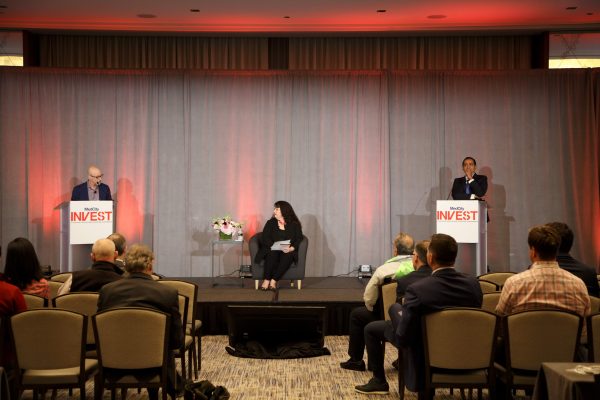
Dr. Stephen Klasko, moderator Lisa Suennen and Dr. Sachin Jain at MedCity INVEST
Consumer-centric trends from various other industries are moving to the healthcare world. Patients desire not only a quality medical experience but also 24/7 access to care, the ability to quickly schedule appointments and easily navigable tools.
Is this healthcare consumerization trend becoming overhyped? That question was the focus of a debate at MedCity INVEST in Chicago on April 24.
Dr. Stephen Klasko, president of Thomas Jefferson University and CEO of Jefferson Health, argued that consumerism is on the rise and that we’re on the brink of a revolution.
“I think that nobody knows when a revolution’s about to come. [There are] always warning signs,” he said. “I believe what’s about to happen is going to be a consumer revolution.”
Consumers’ attitudes are changing and they have lost trust in the healthcare system, he added.
Thus, as alternatives to the traditional healthcare model emerge, consumers are going to jump on the bandwagon. The way we react to existing “warning signs of a consumer revolution” will define what happens next, Klasko posited.

A Deep-dive Into Specialty Pharma
A specialty drug is a class of prescription medications used to treat complex, chronic or rare medical conditions. Although this classification was originally intended to define the treatment of rare, also termed “orphan” diseases, affecting fewer than 200,000 people in the US, more recently, specialty drugs have emerged as the cornerstone of treatment for chronic and complex diseases such as cancer, autoimmune conditions, diabetes, hepatitis C, and HIV/AIDS.
The other debater, CareMore Health president and CEO Dr. Sachin Jain, took an alternative perspective.
He believes most of Klasko’s thoughts are reasonable. However, he said the consumerization idea doesn’t apply to the sickest patients, and most of our healthcare costs go toward taking care of this group.
“I don’t think that this is a trend that ultimately is going to extend across all populations,” Jain said. “The idea of actually putting more and more responsibility into the hands of people to make decisions at times when they’re least able to make decisions, to me, is one that’s worth debating.”
Instead, he argued that what’s most important is to create a healthcare system that can proactively identify patients’ needs and meet them.
Although an official winner of the debate was not determined, both speakers ended on a hopeful note.
“I think we’ve sort of made it too easy to say ‘it can’t happen’ in healthcare,” Klasko said. However, he believes the industry’s defeatist attitude will end at some point in the future.
Jain’s final comments centered around investing in leadership. “Things don’t change because they just change,” he said. “I think they change because people decide that they need to change.”
Photo: Natalie Bahmanyar












